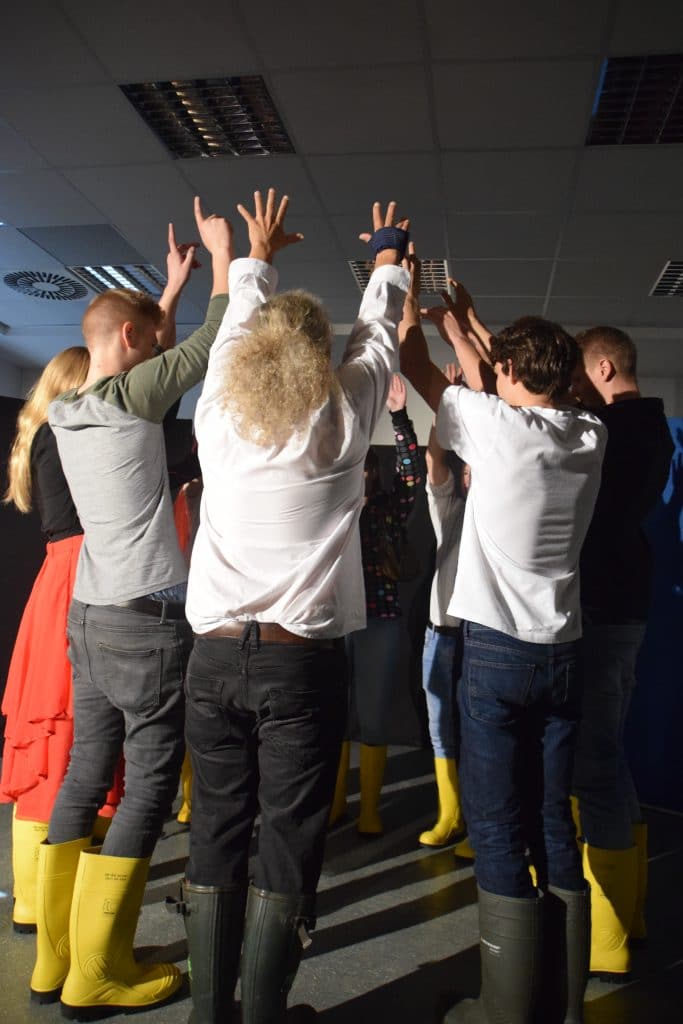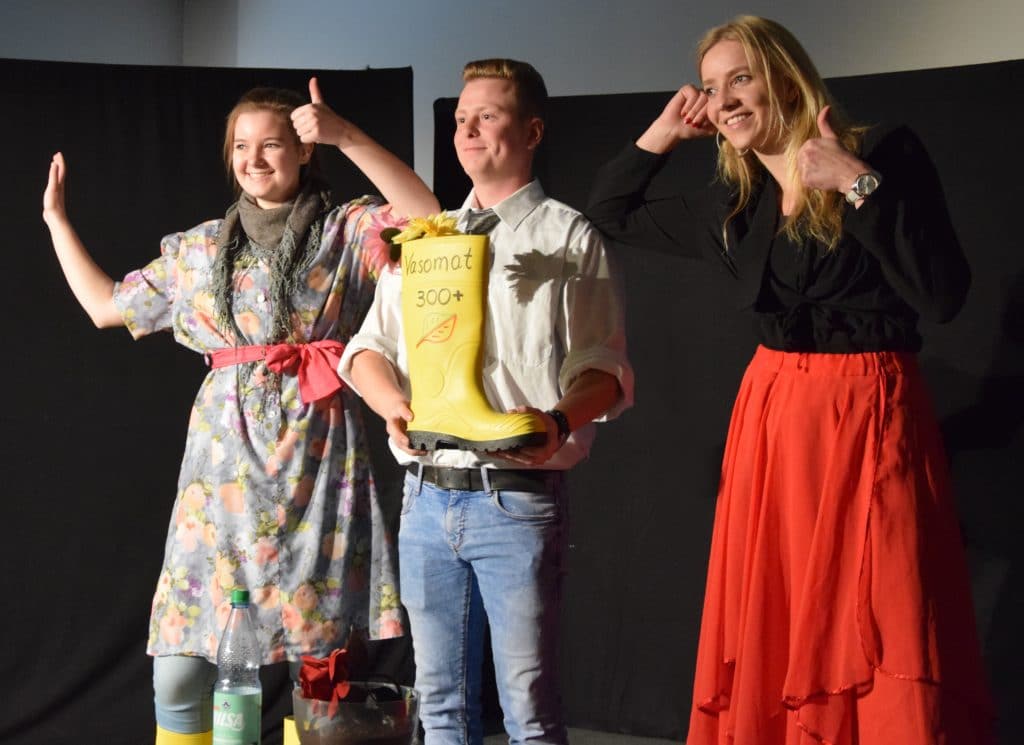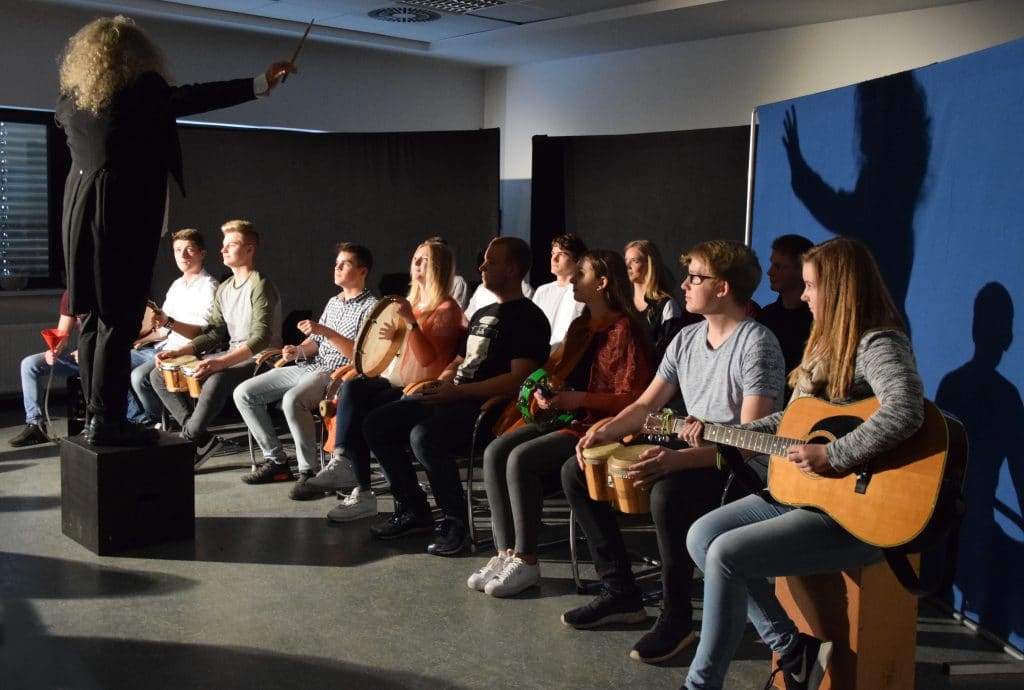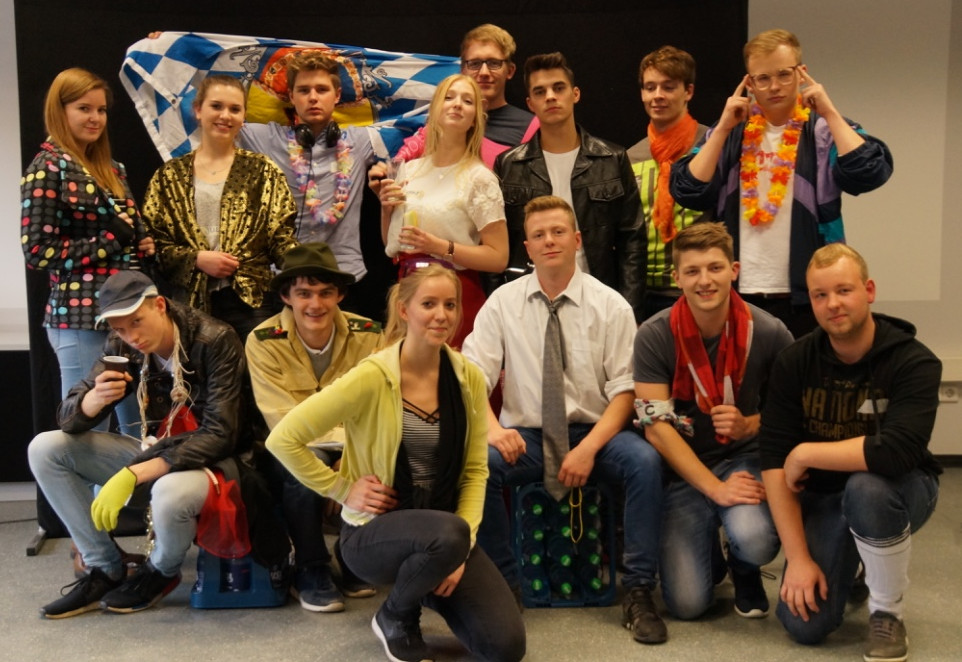Our vocational trainees get all dramatic
Acting workshop in Groß Hesepe
Our vocational trainees, participants in a drama workshop, had three days – from Tuesday to Thursday – to work on a play. As they had to premiere their production on the Friday, the clock was ticking. Their venue was the new lecture theatre in Groß Hesepe.
Stamping their feet, clad in yellow rubber boots, and forming a caravan, our vocational trainees enter the stage. They make a circle, each individual either sideways on to, or with their backs to, the audience. This conveys that the cast are a close-knit group. They move rhythmically to a recording of the Nancy Sinatra song ‘These boots are made for walkin’’, until the music abruptly stops and the trainees, cursing, go their own separate ways.
The rubber boots are something of a recurring theme in this production, functioning as ‘teleportation shoes’ for golfers, the ‘Vasomat’ sensor for house plants and the ‘Multitool’ device at a festival. Our trainees demonstrate how versatile a pair of yellow wellies can be and their advertisements are smart, humorous and ironic, as evidenced by the fact that the Multitool can be used for cooling drinks, heating up food or ‑ who’d have thought it? ‑ keeping one’s feet dry in the rain (unlike flipflops)! ‘Multitool ‑ means your beer is always cool’, ‘Multitool ‑ means your feet need never be cool’ and ‘Multitool ‑ means you’re always cool’ ‑ with slogans and self-satisfied smiles, the trainees extol the virtues of this miracle footwear.
With a commercial parodying the stereotypes of advertising aimed at the housewife market, our trainees get the audience enthusiastic about the ‘Vasomat 300 +’. Lorena Ahrens plays the despairing Hausfrau, convincingly morose and shame-faced as she admits her house plants have died on her again. Naturally, however, her stylish friend (Sabrina Walker) knows what to do: “I’ve got just what you need – the Vasomat!” The pithy but catchy slogan “Red means it’s barely alive, green means it’s going to thrive” is repeated with hoots of laughter by many members of the audience after the play.
Just wellies?
Reading between the lines, it becomes clear that the boots also have a wider symbolic meaning. After all, the experiences of a vocational trainee may include shaking in one’s boots (at first), and maybe even occasionally feeling like the rug has been pulled out from under one’s feet. Not to mention putting one’s best foot forward and the daily task of booting up one’s computer …
And acting, of course, means stepping into someone else’s shoes, which they all do convincingly. It is obvious that the end of the play will be met with thunderous applause for our trainees, as the audience have enjoyed themselves tremendously. The talented young cast not only impress the theatregoers by virtue of having put on a play after only three days ‑ quite a feat ‑ but with their expressive use of their bodies, voices and music, their humour and their knack for parody.
“The trainees really did do everything themselves, from writing the script to the staging,” said drama teacher Liane Kirchhoff of Osnabrück-based educational drama provider ‘theaterpädagogische werkstatt gGmbH’ after the public performance. “All we did was provide them with some guidance and the tools they needed.” The basics of stage acting, ways of being aesthetically creative, the use of one’s body, breathing and voice, and developing characters ‑ these were just some of the aspects that the two drama educators Liane Kirchhoff and Michael Walter Schroth covered with the trainees. “Putting this on in such a short time was quite an achievement.”
Personality development
In an interview with our editorial staff, the participants revealed that the four days of the workshop and performance had been a real challenge. “It was fantastic fun, but we were exhausted every evening,” says Business Informatics student Jakob Schoofs. “I think the reason was that we had an incredible amount to process.” It was the drama exercises that he found most stimulating: improvisation, concentration and being aware of one’s fellow actors. Has eye contact been established? What is the other person’s posture telling me? These things are useful in everyday life as well.
Sabrina Walker also feels there are real-world applications: “For example, I now have a whole new awareness of the effect of my personal demeanour on others.” The workshop was also a good opportunity for everyone to get to know the trainees at the location other than where they themselves were based. “The biggest challenge came on the first day. We were instructed to laugh, cry, scream and get angry on cue ‑ in front of people, some of whom I’d never met. After we’d all got acquainted with each other, this made the other days easier. We grew in confidence and everyone contributed.”
Our Training Manager Andrea Bruns explains the rationale for including the drama workshop as part of the training plan: “Training is not only the dissemination of know-how, but also personality development.” She feels the output really is to be applauded in every sense: “During the workshop, the trainees got to know each other well and grew into a team ‑ regardless of what they’re training to become and where they’re doing it. Together they developed scenes that they presented to a sizeable audience on the final day. During this process they were creative, invested great collective effort in the outcome and showed perseverance. And, importantly, they experienced shared success and can be proud of what they offered up ‑ a good foundation for greater self-confidence.”



